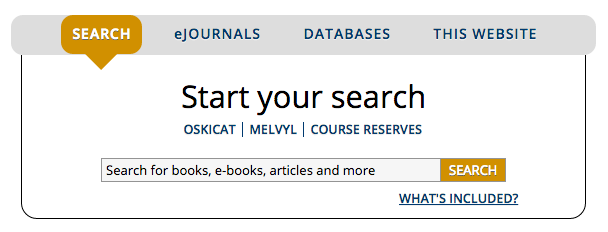 Start your Search includes books, articles and more.
Start your Search includes books, articles and more.

Start your search is powered by EBSCO Discovery Services and combines a variety of library collections, catalogs and databases into a single search experience.

Access UC Library Search directly or from the Library homepage to find most (what isn't included?) books, articles, media, archival collections, and more from:
Sign in to view all results and to manage your:
Off campus? Use the proxy or the VPN for full access. (You may be prompted to sign in again.)
You can use UC Library Search on the Library homepage to search across various book and article databases simultaneously. To find the best resources for your topic, you might want to go directly to a specific database.
Find the best database(s) for your research topic:
General article databases are a good place to start since they include both popular and scholarly journal titles covering numerous disciplines. Simply choose one of those databases and type in your keywords to begin to find articles.
Browse for databases by subject (such as Economics, Electrical Engineering, or Art History) if you want to dig deeper into resources covering a specific discipline. If you aren’t sure what subject to choose, look for the academic department that your class is listed under. Once you’ve chosen a subject, search for your topic in one or two of the recommended databases that are listed on the top of the subject list.
Browse for databases by type if you want to find other kinds of formats, such as encyclopedias, newspapers, government information sources, statistics, maps, images and more.